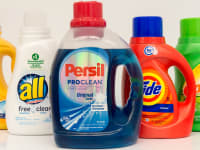Here's what you need to do when your appliance breaks
Flooded kitchen got you down? We can help.
Products are chosen independently by our editors. Purchases made through our links may earn us a commission.
Let’s face it: We’re bound to our home appliances. We need them to keep our food cold, cook our meals, clean our laundry, wash our dishes, entertain us, and keep us connected. In so many ways, we can’t function without our appliances. But, really, t’s only a matter of time before an appliance starts to show its age, and, when something goes wrong, we want the problem fixed, now.
Often, the big question is: Can this be fixed, or do I need to replace the appliance?
In order to answer that question, you’ll need to call in an appliance repair expert—unless, of course, your appliance is on fire, and then you should just assume the worst. In the meantime, it doesn’t hurt to know the basics for when the time comes.
Here’s what you should know about scheduling an appliance repair, whether it be a washing machine or dryer, a stove, a dishwasher, or a fridge.
What to do if it’s an emergency
If you’re experiencing an appliance emergency, like a gushing water leak from your washing machine or gas odor, you need to resolve the situation as soon as possible.
First, in the case of a fire or gas leak, evacuate your home and call local authorities or 911 immediately.
For a less dangerous situation, like a water leak or a broken air conditioner, you’ll need to access an emergency repair company that you can reach 24/7, says Ron Shimek, president of Mr. Appliance. Many local companies offer 24-hour emergency repair service, so get to know which ones are available around you—before you have a problem. Make a list and pop it on your fridge or in your phone.
If you have the option to wait up to a few hours, Puls is among the repair services that offer same-day repair services.
When it’s time to call an appliance repair service for non-emergencies
Your dryer isn’t drying the way it used to, or your freezer just isn’t cold. When a malfunction occurs, you need to decide whether to hand over the repair to an expert. Shimek says to look for a few key warning signs that mean it is time to call in an expert.
If the appliance won’t turn on, make sure that no circuit breakers have been tripped and its vents or filters aren’t clogged. If there’s still no sign of life, Shimek says to call an appliance repair service at this point.
Here’s something else to look out for: If you suspect your appliance—from large ones like a dishwasher to smaller ones like a garbage disposal—could be the culprit of a high utility bill, this may signal an issue that needs professional attention. High gas, water, or electric bills, especially if it has spiked in just one month, could mean that your appliance is malfunctioning and hogging more energy than it should, Shimek says. If you’re unsure what the malfunction is, you should get in touch with a repair service to figure out the problem.
In better case scenarios, you may only need to consult with an appliance repair service virtually, or perhaps even solve the problem on your own with a little help from online resources or even a comprehensive book full of troubleshooting tips on maintaining and repairing some common appliance problems.
For example, if your dryer isn’t properly drying your clothes, but it used to, there may simply be a lint buildup in the exhaust vent that you need to clear out.
However, if you try a few basic fixes and can’t resolve the problem on your own, Shimek recommends erring on the side of caution and consulting an expert. “A DIY repair could potentially cause personal injury, void your warranty, or ultimately waste your money on non-refundable replacement parts if you accidentally misdiagnose the problem.”
How to select a repair service
Before making the call to an appliance repair company, you should evaluate whether you should contact the manufacturer, the retailer, or a local handyman for the job.
Your appliance most likely comes with a warranty. Depending on the problem and how long you’ve owned the appliance, the manufacturer may fix or replace the appliance, covered by the warranty.
To take advantage of this warranty, you can schedule an appointment with major appliance brands like GE, Samsung, and LG. For example, GE offers a 5-year warranty effective on any parts that are needed for an appliance repair. This is a cost-effective route for a repair on a fairly new appliance—just be sure to do your research so you know what is covered.
If you purchased a protection plan with a retailer, this may be the least costly option for a repair. Sears Home Services, The Home Depot, Best Buy’s Geek Squad, and Lowe’s all offer protection plans that range from coverage of repairs before a warranty ends, parts and labor costs, complete replacement coverage, and more.
If these two options don’t apply to you, it’s time to connect with a third party repair service like A&E Factory Service and A1 Appliance Repair. Or, select from a nationwide database like Puls or Angie’s List to find the right local technician for you.
Before choosing the right third-party company, Shimek recommends doing your due diligence and making sure you’re hiring experienced and knowledgeable technicians for your repair. Read online reviews and talk to your friends, relatives, and co-workers for their recommendations on experts and services they rely on.
Shimek also advises making sure the company—whether that be a retailer or local contractor—has a guarantee policy. This policy should honor any additional repairs needed for any reason after the initial repair, so your bases are covered just in case you need any more follow-up repairs. “This gives you peace of mind knowing you won’t have to worry about future issues,” Shimek says.
How much you should pay for a repair
Not all appliance repairs are costly, but many are. And, you don’t want to pay more than you expect to by letting hidden repair costs sneak up on your bill. When researching appliance service companies, make sure you clarify what charges to expect in your specific case.
“If you have a professional install it, labor costs will increase the price,” says Shimek. “Newer appliances may also not fit where the old unit sat, which may require you to make modifications.”
Do expect to be hit with additional charges if a permit is necessary for completing electrical work, or if a certified electrician with specific training is working on your appliance.
If you’re unsure whether or not your costs are on par with what’s average, use resources like HomeAdvisor to see what appliance repair experts in your area typically charge.
If your appliance is fairly new and still has its warranty, Shimek recommends scheduling a service call out of caution. “Labor and parts may still be fully covered so you can have the repair done for free,” says Shimek.
If you’ve opted for a store protection plan, check on the details of what covers your appliance repair—you may end up with a repair at no cost to you.
Wondering if renters’ or homeowners’ insurance will cover repairs? Shimek says it’s best to connect with your insurance provider on this. “Review your specific coverage and connect with your provider to determine what scenarios, if any, where your appliances are protected.”
When it’s time for a replacement instead of a repair
Well, you’ve tried the repair route to no avail. Perhaps your repair service has given you a recommendation as to what is the best course of action based on the severity of the appliance’s damage and its age.
Shimek offers a pro tip: “Abide by what’s known as ‘the 50% rule.’ The 50% rule states that if your appliance is more than 50% through its lifespan and a repair is also more than 50% of the cost to buy a new one, it’s better to replace the appliance.”
So, it’s time to replace your appliance. While this option will cost you cash, it can also be exciting to buy the flashiest, smartest, newest, and/or best-fit-for-your-lifestyle appliance.
But don’t just go to a store or website and buy something on the spot. Do your research!
Look at consumer publications and websites—like Reviewed—that feature reviews and commentary about appliances that are currently on the market. We have our own testing labs and can offer recommendations on appliances large and small, including fridges, washing machines, dryers, microwaves, dishwashers, air conditioners, and more.
You can also check out reviews on retailer sites like The Home Depot, Lowe’s, Sears, Best Buy, Amazon, or Appliance Connection.
The product experts at Reviewed have all your shopping needs covered. Follow Reviewed on Facebook, Twitter, and Instagram for the latest deals, product reviews, and more.
Prices were accurate at the time this article was published but may change over time.


